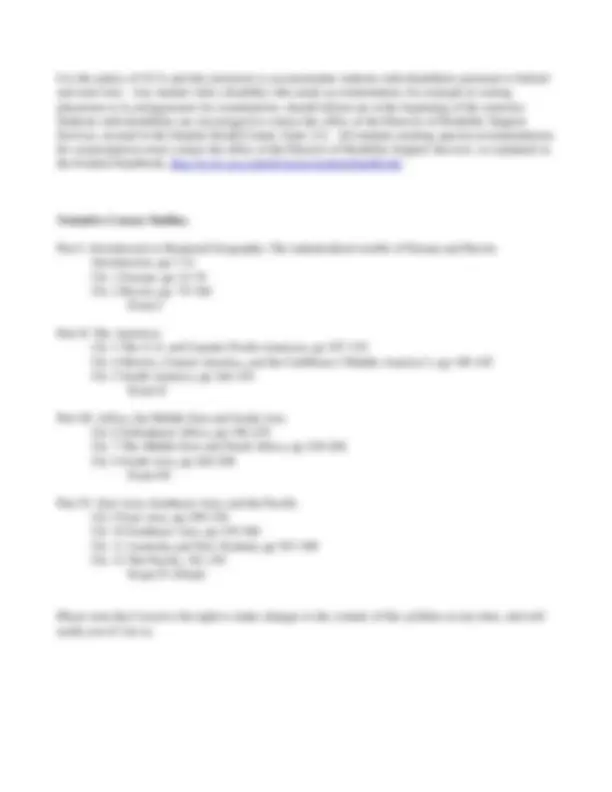



Study with the several resources on Docsity

Earn points by helping other students or get them with a premium plan


Prepare for your exams
Study with the several resources on Docsity

Earn points to download
Earn points by helping other students or get them with a premium plan
Community
Ask the community for help and clear up your study doubts
Discover the best universities in your country according to Docsity users
Free resources
Download our free guides on studying techniques, anxiety management strategies, and thesis advice from Docsity tutors
Explore the physical and cultural geography of earth's major regions in this lecture and discussion-oriented course. From north america and europe to africa, asia, and the pacific, gain a deeper understanding of how places differ from one another and how physical and cultural realities interconnect. This required course for geography majors and minors at the university of central arkansas covers topics such as agriculture, industry, settlement patterns, housing, language, religion, and more. Come prepared to engage in class discussions and take good notes.
Typology: Study notes
1 / 3

This page cannot be seen from the preview
Don't miss anything!


GEOG 3300 (14144). World Regional Geography. 11:00-11:15 MWF.
Instructor: Dr. Michael Yoder Office: Irby 301C Phone: 501.450. Internet: myoder@uca.edu Web page: http://www.uca.edu/divisions/academic/geography/Yoder.htm Office Hours: 11:50-1:30 MWF; 9:15-10:45 TR
Catalog Description: A required course for geography majors and minors. A lecture and discussion- oriented course that focuses on the physical and cultural geography of Earth's major regions: U.S.A. and Canada, Latin America, Europe, Russia and the Near Abroad, Middle East and North Africa, Africa South of the Sahara, Monsoon Asia, and the Pacific World. Prerequisite: None.
Additional Description: Geography is often regarded as the "spatial science" because of its focus on spatial patterns and processes that natural and human activities exhibit over the surface of the earth. As such, it becomes largely a study of how places are unique from one another, including physical terrain, climates and weather patterns on one hand (in other words, "physical geography"), and human activities such as agriculture, industry, settlement patterns, housing, language, religion, and other facets of culture and society on the other hand. Further, it is about how the physical and cultural realities of the earth are inter-related, thereby mutually reinforcing the differences from place to place. Regions are areas that have unique characteristics that make them distinct from other places, so a regional course is a natural area of inquiry for geography. Agricultural terraces in the mountainous regions of Guatemala, Peru, Indonesia, the Philippines, and the Arabian Peninsula are not all the same, because the cultures that produced them are not the same, nor are the political and demographic conditions that yielded that type of human landscape. Yet these terraces do share something in common: they are an adaptation to rugged terrain not found in coastal plains containing favorable soils. And they are different from the expanses of relatively flat and highly productive agricultural lands of the world's grain regions that produce massive quantities of crops through mechanization. Manufacturing regions such as Southeastern China, Northwestern Mexico, the American "Midwest" and Western Europe are quite different from one other in terms of the goods they produce, the technologies they employ, the transportation infrastructure that links them to distant markets, and the conditions of the work forces that keep them productive. Houses of worship vary from lavish mosques that adorn urban skylines in Morocco and Egypt, to cathedrals that define the character of medieval-era cities of Europe and Latin America, to large concert-hall type contemporary church auditoriums in recently-constructed suburbs of the United States. As the world becomes more tightly integrated through commerce, politics, and migration, we should all strive to be better global citizens and develop a greater awareness and understanding of the cultural and environmental variations from region to region.
Reqired Textbook: DeBlij and Muller: The World Today: Concepts and Regions in Geography , Third Edition. Wiley Press.
Recommended Book: Rand McNally: Atlas of World Geography (or similar).
My Expectations of Students: Come to class. Tune in to the class. Read the assigned readings. Take good notes of the lectures and of the assigned readings. Be prepared to discuss the material in class so that the lectures are more meaningful, interesting and fulfilling than they would otherwise be. Be
respectful of other students during discussions in class. In a social science setting opinions will vary throughout the class, and as adults we can handle the differences with respect and courtesy. Be courteous to fellow students by refraining from annoying habits like talking during class or getting up excessively to leave and re-enter the class. Given the unfortunate epidemic of cellular phones and the lack of etiquette that goes along with them in today's society, they and pagers must be turned off and put away during class. MP3 players and iPods serve to distance the student from the classroom experience, and their use will not be allowed in class. Laptop computers may be used for one thing only: to take notes if you prefer that to the traditional use of paper and pen or pencil. Please note, however, that traditional methodology of taking notes is better because as I make drawings on the board to explain processes, you can make drawings in your notebooks along with me. Note that I reserve the right to ban laptop computers from class if excessive misuse of them (surfing the web, instant messaging, e- mailing friends, etc.) becomes a problem.
Evaluation of Student Performance: Your course grade is based on the traditional scale (A=90-100; B=80-89; C=70-79; D=60-69). There will be four exams, each worth 20 percent of your grade. Exams will be a combination of objective questions (primarily multiple choice) and short essays. Exams will be announced one week in advance. There will be five map quizzes, each of which will be announced one week in advance. I will count the best four of these five quiz grades, and collectively the map quiz grade will comprise 20 percent of your course grade. To recap, your grade is calculated as follows: Exam I 20% Exam II 20% Exam III 20% Exam IV (final) 20% Map quiz grade 20%
Makeups of exams and quizzes: I strongly dislike makeups and reserve the right to deduct one letter grade from any makeup exam if in my judgment the reason for missing it is not legitimate. There will be no makeup quizzes, given that I drop the lowest quiz grade. However, if you know that you will be missing a map quiz, you may take a version of the quiz ahead of time without penalty, provided you take the initiative to make the arrangements with me during my office hours.
Other Matters:
I cannot read minds. If you are having difficulty with the course, it is your responsibility to come to me for discussions of the course content, study skills, and the like. The University Catalog and University Web Site outline important dates that students are responsible for knowing, such as drop dates.
All of the university rules about plagiarism and academic dishonesty, as covered in the UCA Student Handbook, apply fully to this class, and violations of university policy will not be tolerated. Sexual harassment is not allowed in this class or at UCA. This and other inappropriate forms of behavior are covered in the UCA Student Handbook and it is the student's responsibility to become familiar with all policies listed in the Student Handbook, which can be accessed at: http://www.uca.edu/divisions/student/handbook/
The Drop Policy of the University as covered in the UCA Student Handbook applies to this course. Students are responsible for knowing dates for dropping courses, as outlined in the catalog. This information can be accessed at: http://www.uca.edu/schedule07/html/academiccalendar.php